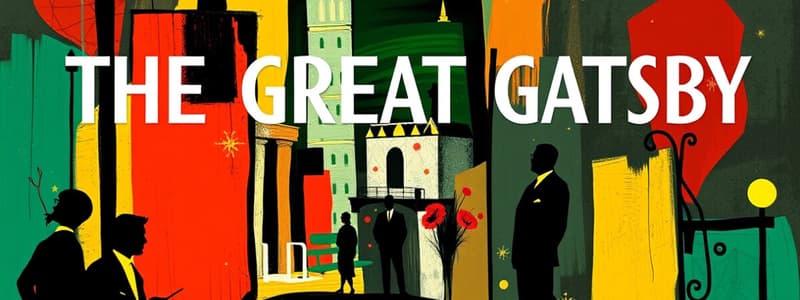Podcast
Questions and Answers
What is the motive publicly given for Wilson's murder of Gatsby?
What is the motive publicly given for Wilson's murder of Gatsby?
It is said that Wilson was a mad man and went crazy.
What does the telephone call from Chicago tell us about Gatsby's business?
What does the telephone call from Chicago tell us about Gatsby's business?
Gatsby was involved with organized crime.
What does Klipspringer want from Nick? How does Nick react to this?
What does Klipspringer want from Nick? How does Nick react to this?
He wants to pick up a pair of tennis shoes. Nick is revolted and hangs up the phone.
Why is Gatsby's father so proud of him?
Why is Gatsby's father so proud of him?
What does Tom confess to Nick when they meet that fall? Does he regret what he has done?
What does Tom confess to Nick when they meet that fall? Does he regret what he has done?
What does Nick mean when he says, 'this has been a story of the west, after all'?
What does Nick mean when he says, 'this has been a story of the west, after all'?
How does Nick characterize Tom and Daisy at the end of the book?
How does Nick characterize Tom and Daisy at the end of the book?
How does Nick imagine the continent must have been like when it was first seen by Dutch sailors?
How does Nick imagine the continent must have been like when it was first seen by Dutch sailors?
What does the green light symbolize at the end of the novel?
What does the green light symbolize at the end of the novel?
Flashcards are hidden until you start studying
Study Notes
Motives and Actions
- Wilson is portrayed as a mad man, leading to the assumption that his motive for murdering Gatsby is rooted in insanity.
- A phone call from Chicago hints at Gatsby's involvement in organized crime, suggesting a darker side to his wealth.
Character Insights
- Klipspringer, referred to as a "boarder," contacts Nick for tennis shoes, prompting Nick’s revulsion and desire to end the conversation.
- Gatsby’s father, Henry C. Gatz, is devastated by Gatsby's death but proud of his son's self-improvement efforts, as seen in Gatsby's meticulously planned schedule.
Reflections on Tom and Daisy
- Tom Buchanan admits responsibility for sending Wilson after Gatsby but shows no remorse, indicating his cruel nature.
- Nick observes that Tom and Daisy's wealth insulates them from the repercussions of their actions, emphasizing their moral bankruptcy.
Thematic Contrasts
- Nick’s comment about the East being corrupt contrasts with the perceived authenticity of the West, where he and Gatsby originated.
- The East is portrayed as a landscape of moral decay and selfishness, leading Nick to return to a more genuine existence in the West.
Characterization of Tom and Daisy
- They are depicted as vapid and self-indulgent, lacking real emotion and humanity; they have "smashed" the illusion of genuine love and care.
- Nick expresses a deep sense of disgust towards them, showcasing their ultimate emptiness.
Symbolism and Imagery
- Nick imagines the pristine, untouched environment seen by Dutch sailors, contrasting sharply with the decayed Valley of Ashes that symbolizes greed and disillusionment.
- The green light at the novel's end represents Gatsby's aspirations and dreams, extinguishing as a foreshadowing of his tragic fate, illustrating the futility of his pursuits.
Studying That Suits You
Use AI to generate personalized quizzes and flashcards to suit your learning preferences.




